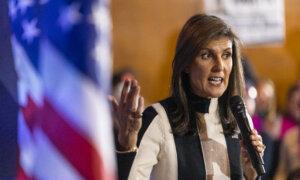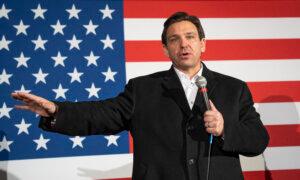The former president won the Iowa Caucuses by a historic margin with a 30-point lead over DeSantis who came second.
DES MOINES, Iowa–Former President Donald Trump has captured the 2024 Iowa caucus, according to multiple early projections.
The Associated Press declared a victory for the former president just 32 minutes into the voting process on the evening of Jan. 15. Other media have also called the race for President Trump.
No Republican has ever won the Iowa caucuses with a margin of more than 12 percentage points. The president was ahead by a multiple of that amount when the race was called. The final vote count was expected to be in by 1 a.m. EST.
Former President Donald Trump told Fox News Digital after being announced the victor in the Iowa Caucus that he “feels great.”
“I am greatly honored by such an early call,” President Trump said, referencing the Associated Press calling the race for him at 8:31 p.m. ET.
“It really is an honor that, minutes after, they’ve announced I’ve won—against very credible competition—great competition, actually,” President Trump said. “It is a tremendous thing and a tremendous feeling.”
“We have to get our country back,” he added. “Our country has gone through so many bad things over the last three years and it is continuing to go through bad things.”
As of 11:45 p.m ET with more than 95 percent of the votes counted, President Trump held 51 percent of the vote. Trailing him in the polls were Florida Gov. Ron DeSantis with 21.2 percent, former South Carolina Gov. Nikki Haley with 19.1 percent, and entrepreneur Vivek Ramaswamy with 7.7 percent. Mr. Ramaswamy announced he was dropping out of the race earlier in the night and endorsing President Trump.
This 30-point margin means the former president has smashed the record for the largest Iowa win ever, with the previous record margin of 12.8 percent.
For many months, polls had shown that President Trump held a commanding lead over all his Republican rivals.
In the final days of the Iowa contest, the four remaining major candidates battled inhospitable pre-caucus weather. Winter storms dumped several inches of snow throughout the state, leaving many roads impassable. After the snow slowed, strong winds created massive snowdrifts and produced life-threatening wind chills.
Mr. Ramaswamy continued to hold events, while other candidates canceled some appearances during the final few days before caucus night.
After a blizzard warning expired on Jan. 13, President Trump resumed campaigning with an in-person rally in Indianola, south of Des Moines, on Jan. 14. An overflow crowd of more than 800 people turned out despite temperatures hovering at roughly minus 17 degrees.
A second in-person rally for President Trump had been slated for Cherokee, a 3 1/2-hour drive under normal conditions. But with many roads still slow-going because of compacted snow, the Trump campaign replaced that event with a “tele-rally” via livestream.
Thomas Hagle, a professor at the University of Iowa, told The Epoch Times that the inhospitable weather added more unpredictability to the contest.
A dangerously cold wind chill factor was “likely to deter some people from turning out” on caucus night, but it would be hard to say which candidate’s supporters would be most affected—and to what degree—Mr. Hagle said on Jan. 14.
“Older people might be particularly concerned about the severely cold weather, but they are also the most reliable voters. Younger people have lower turnout in general, and less experience with the caucuses, so they might be likely to change their minds about attending,” he said.
“Even assuming that turnout will be down because of the weather, it’s hard to say which, if any, of the campaigns will be affected more. Each campaign’s ground game will be important in this respect.
Momentum Versus Organization
Pollster Rich Baris, in his Big Data Poll of Iowa released on Jan. 12, said the three lesser-performing candidates were in a “statistical dead heat” in Iowa.
“This has become a classic case of momentum versus organization,” Mr. Baris said in a press release. “Ambassador Haley has momentum, albeit potentially fizzling, while Governor DeSantis has touted a superior organization.
“Mr. Ramaswamy appears to have a little of both, though he remains challenged by his failure—at least thus far—to break through with key demographics critical to the Iowa Republican Caucuses.”
Mr. DeSantis and Mr. Ramaswamy both campaigned extensively in Iowa; Ms. Haley ramped up her presence in the state somewhat later in the game, largely thanks to an endorsement that, unlike many such votes of confidence, came with added firepower.
“Americans for Prosperity endorsed her, and I think that’s a big reason she’s doing better in Iowa [than previously],” said Gary Leffler, a 62-year-old former congressional candidate who remains well-connected in Iowa political circles.
“Before that, she didn’t have a ground game.”
Joan Walsh, a national affairs correspondent for The Nation magazine, criticized Americans for Prosperity’s (AFP’s) late-November 2023 endorsement of Ms. Haley as “too little, too late.” Ms. Walsh also predicted that President Trump would win the Republican nomination just as he did in 2016 because of “vain politicians again splintering the anti-Trump vote.”
Noting that the Iowa caucuses were then only seven weeks away, Ms. Walsh wrote that AFP’s pledge to activate its grassroots operation for Ms. Haley felt like “another exercise in political delusion: a powerful mainstream Republican force pretending Trump doesn’t control the party.”
Tone Set for Next Contests
The Iowa result has implications for the next presidential-preference contests in other states, Mr. Hagle said.
A big victory for President Trump “would likely blunt momentum that Haley has in New Hampshire,” Mr. Hagle said before the caucuses.
“If Trump wins Iowa, New Hampshire, and then in South Carolina, it would seem to be very difficult to stop him unless some extraneous event shakes up the race,” he said.
As for Mr. DeSantis, he needed a strong showing in Iowa “to argue that he has momentum and he plans to go to South Carolina after Iowa,” according to Mr. Hagle.
But if Ms. Haley had tied or beaten Mr. DeSantis in Iowa, she would have had “more momentum in New Hampshire and might be able to get very close to Trump there, or maybe even beat him.”
“That would give her momentum going into her home state of South Carolina,” Mr. Hagle said.
The goal was for Ms. Haley and Mr. DeSantis “to do well enough in Iowa to be able to make the case that they are the most viable Trump alternative,” he said.
Joseph Lord contributed to this report.
Original News Source Link – Epoch Times
Running For Office? Conservative Campaign Consulting – Election Day Strategies!


